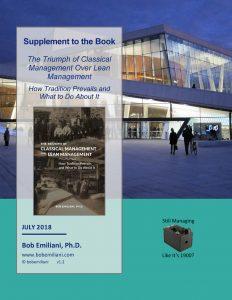
Gaining the attention and commitment of CEOs for Lean management requires that we understand them. We think we do. In fact, we have long thought that we do. But in truth, Lean promoters, advocates, and practitioners never have. Even accomplished Lean CEOs don’t understand their peer CEOs. The many hundreds of people who tried to advance Scientific Management 100 years ago also did not understand CEOs. As a result, efforts to advance progressive management has made remarkably little progress because the top corporate decision-maker — the person who decides whether to adopt Lean and if they will assume an active role in management transformation — was never truly understood, until now.
CEO interest in Lean has been weak over the last 30 years because thousands of Lean promoters and advocates have been focused on the wrong problem. I call it Problem 2: “How do we convince CEOs to adopt Lean?” However, Problem 2 cannot be solved until Problem 1 is solved. Problem 1 is: “Why don’t CEOs adopt Lean?” This problem has existed for a very long time and would have been apparent at the dawn of Lean (circa 1988) if care had been taken to study the successes and failures of its predecessor, Scientific Management movement. Problem 1, unfortunately, was ignored by just about everyone — but not by me.
Is the CEO the customer for Lean? No. The customer for Lean are the people who pay for and use the goods and services supplies by businesses, and society at-large. However, customers do not explicitly ask for Lean management. Yet, customers always demand better — more value, better quality, shorter lead-times, lower prices, more convenience, and so on. So the signals coming from customers and from society are loud and clear. CEOs have choices on how to achieve those demands. But the choice they invariably make is the one that is consistent with the traditions that they are familiar with, and thus they are largely unresponsive to the demands of customers and society.
Recall what Henry Ford said to his customers (paraphrased): “You can have any color [Model T] as long as it’s black.” Likewise, CEOs say to customers (and society): “You can have better as long as it’s produced by Classical management.” Neither are satisfying responses. Business leaders like to say “cash is king.” Since customers are the source of cash, it is wise to listen to customers. Customers, and society, are telling CEOs, indirectly, this: “Classical management is no longer responsive to our needs. It’s time for you to change.” It is madness to continuing using a management system rooted in the 1700s and developed over the centuries in service to an economy and a society that no longer exists.
 Problem 1, “Why don’t CEOs adopt Lean?,” has been answered in my recent work, The Triumph of Classical Management Over Lean and the “Supplement to Triumph of Classical Management.” They reveal the detailed economic, social, political, historical, philosophical, and business ethos that prohibits executive interest in Lean. That does not make CEOs bad people, nor does it make them people who should not be respected. It simply exposes, for all to see and learn, why Lean management is of little or no interest to most CEOs, whether the company is large or small, or even government or NGO.
Problem 1, “Why don’t CEOs adopt Lean?,” has been answered in my recent work, The Triumph of Classical Management Over Lean and the “Supplement to Triumph of Classical Management.” They reveal the detailed economic, social, political, historical, philosophical, and business ethos that prohibits executive interest in Lean. That does not make CEOs bad people, nor does it make them people who should not be respected. It simply exposes, for all to see and learn, why Lean management is of little or no interest to most CEOs, whether the company is large or small, or even government or NGO.
This leaves two choices, though there may be more:
- Continue working on Problem 2 as if Problem 1 has not been solved, and service fulfill whatever amount of demand (pull) for Lean management may come along from CEOs.
- Understand how Problem 1 was solved so that you can understand CEOs. That means to understand their economic, social, political, historical, philosophical, and business ethos, which will then lead to new conversations, new thinking, and new countermeasures that mark the pathways forward.
In other words, take what you learn from The Triumph of Classical Management Over Lean and the “Supplement to Triumph of Classical Management” to devise new and more effective approaches to marketing and selling (pushing) Lean management to prospective CEOs in order to gain their interest (pull). Or, since you now understand CEOs, maybe you should find ways to speak directly to customers and society, or think of other ideas.
Note: The Supplement is intended to go with the book. If you have not read the book, the Supplement may result in misunderstandings or false conclusions about the work, which is solely directed at answering a very narrow question about executive resistance to Lean management — and the answer of which also applies to operational excellence (OpEx) and most other types of corporate transformation.
